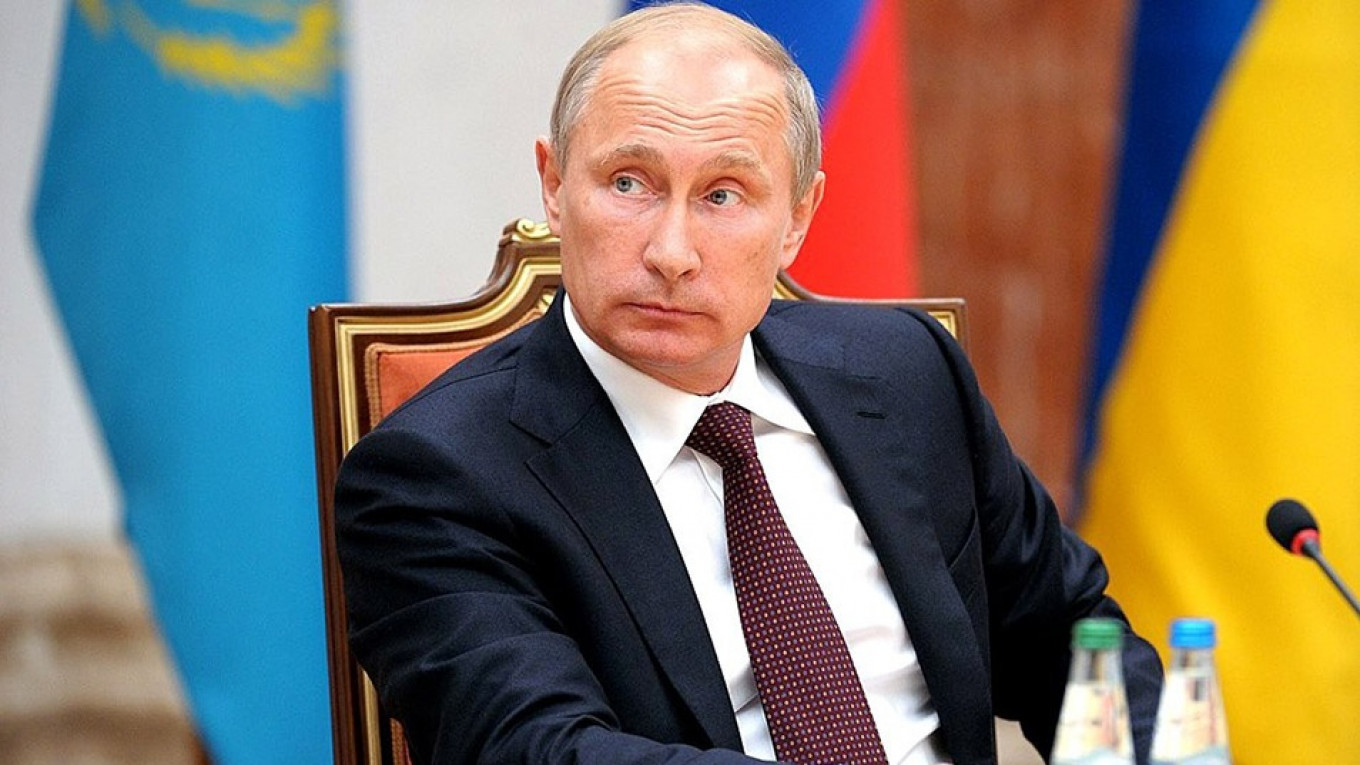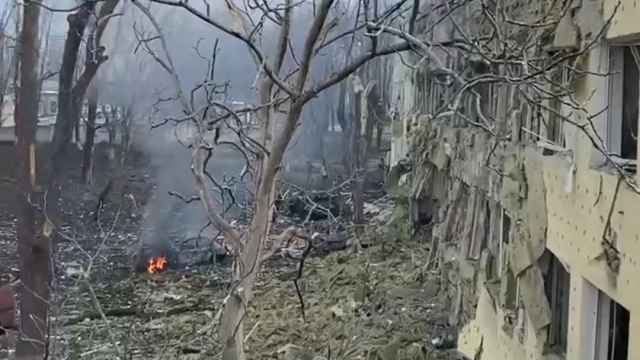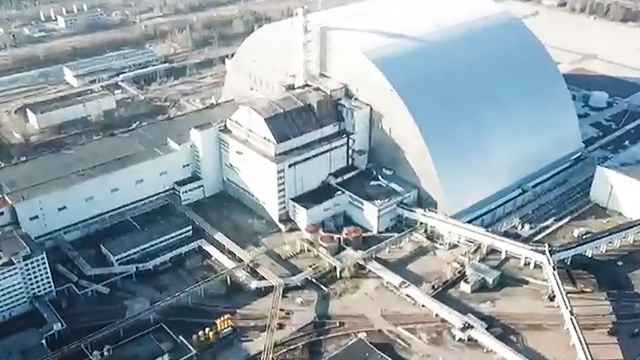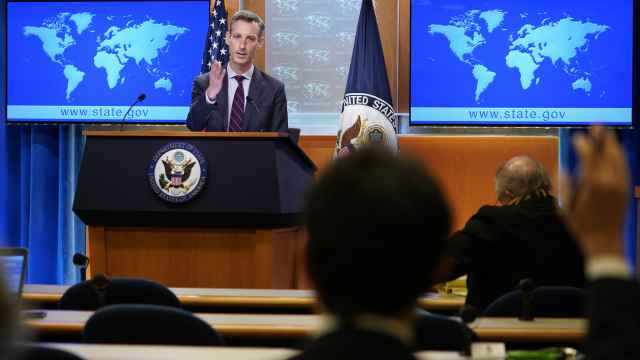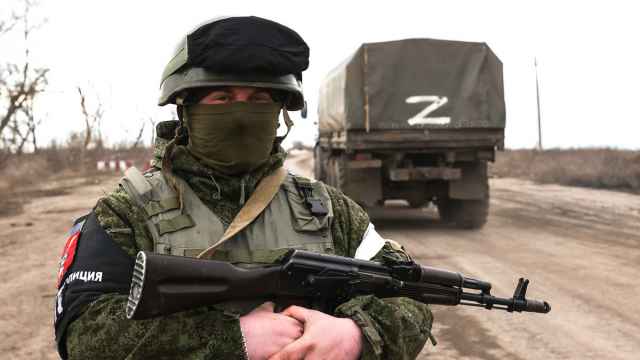Sunday’s dramatic events in the Kerch Strait, where Russian troops seized three Ukrainian navy vessels, highlight the Kremlin’s resolve to hold on to the spoils of its aggression against Ukraine and flout its international obligations. They also show the lengths Ukrainian President Petro Poroshenko is willing to go to remain in power.
The clash had been brewing since April, a month before the opening of a new 12-mile bridge across the Kerch Strait between the Russian mainland and annexed Crimea. The $3.4 billion project was the Kremlin’s way of demonstrating the permanence of the annexation. It also opened a supply route that doesn’t go through Ukrainian territory.
The bridge was built without regard to Ukrainian shipping at two Azov Sea ports, Mariupol and Berdyansk; its central arch is just 33 meters tall, keeping out more than a hundred ships that have regularly docked at the ports. They account for about 9 percent of Ukraine’s grain exports.
Understandably, the bridge isn’t popular in Ukraine and Moscow is paranoid about Ukrainian sabotage. The Russian coastguard has been holding up mainly Ukrainian merchant ships and conducting exhaustive checks, which Ukraine and the European Union have interpreted as harassment, even a partial blockade.
The checks are, indeed, illegal. In 2003, Russia and Ukraine agreed to the free movement of each other’s ships through the Kerch Strait and the Sea of Azov. Russia argues that the inspections are justified on security grounds and rarely exceed three hours – though some have lasted days.
Sunday’s escalation came when Ukraine tried to move three navy vessels from Odessa on the Black Sea to Mariupol. The Russian authorities proved unwilling to let warships, even small ones, pass. Though Ukraine warned Russia that the ships were coming, the Russian coastguard rammed one of the vessels and seized all three, wounding six sailors, according to the Ukrainian navy. Russia also blocked the passage under the Kerch Strait bridge with a container ship and sent warplanes.
Ukraine’s reaction was forceful. It called a United Nations Security Council meeting for Monday, demanding more sanctions against Russia. Foreign Minister Pavlo Klimkin warned that Russia could be planning “further acts of aggression.” And Ukraine’s Security and National Defense Council recommended martial law for 60 days – something Ukraine never did during the Crimea annexation and several big battles in the country’s east. Poroshenko backed the decision, and the Ukrainian parliament will probably approve it.
Formally, there’s a reason to introduce martial law now that didn’t exist during the bloodiest fighting. Russia has denied involvement in those battles in Ukraine’s east; as it did during the Crimea annexation before it admitted sending troops. Now, however, Russian forces have openly attacked Ukrainian ships in violation of a treaty. It’s no stretch to interpret this as an act of war.
Russia, though, has been quick to point out that the escalation benefits Poroshenko domestically. Russian Deputy Foreign Minister Grigory Karasin called the Ukrainian warships’ voyage a “provocation.” “Apparently, against this background it’s easier for Poroshenko to unfold his election campaign,” Karasin said.
The presidential election is scheduled for March 31. It can’t be held while the country’s under martial law, but if it’s introduced for 60 days only, the vote can take place as planned. Yuri Birukov, a Poroshenko aide, wrote on Facebook on Sunday that the administration doesn’t intend to put off the election.
Poroshenko cannot run on economic achievement. Five years after its Revolution of Dignity, Ukraine is Europe’s poorest country with an economy stuck below the pre-revolutionary level and no breakthrough in sight while oligarchs and corrupt officials keep preying on it. Recent scandals (a top official fled across the border this month after evidence surfaced of his bribe-taking) aren’t helping the president. So he’s highlighting his patriotism instead and his success in ripping Ukraine from Russia’s orbit. His campaign slogan is “Army, Language, Faith.” That’s a surprisingly hard-core nationalist agenda for a confectionery tycoon who was, until recently, involved heavily in business with Russia.
According to recent polls, the strategy isn’t working. Poroshenko is behind the populist former prime minister Yulia Tymoshenko and comedian, actor and producer Volodymyr Zelensky. Taking a stand against Russia just before the election could bolster the commander-in-chief’s chances. The timing of the naval raid and martial law plan is interesting.
On the other hand, Russian President Vladimir Putin, who’s losing support at home because of unpopular moves such as raising the retirement age, isn’t averse to an escalation either to bring back some of the patriotic spirit kindled by Crimea. Putin and Poroshenko cannot disguise their mutual hatred when they’re in the same room – but they’re natural allies on weapon-rattling with no military or strategic purpose.
Neither is interested in all-out war, however. An “official” conflict involving Russia’s regular military would mean a sharp rise in the death toll and that’s a potent antidote to the rousing rhetoric. Both leaders will keep the confrontation simmering and the propaganda guns blazing, but they’ll be careful not to set off anything like the Russo-Georgian war of 2008.
Accidents are possible, though, given the likely months of brinkmanship. So too are harsher Western sanctions against Russia, which refuses to give an inch in a situation that’s as damaging to its prospects as it is to Ukraine’s.
Leonid Bershidsky is a Bloomberg Opinion columnist covering European politics and business. He was the founding editor of the Russian business daily Vedomosti and founded the opinion website Slon.ru. The views expressed in opinion pieces do not necessarily reflect the editorial position of The Moscow Times.
A Message from The Moscow Times:
Dear readers,
We are facing unprecedented challenges. Russia's Prosecutor General's Office has designated The Moscow Times as an "undesirable" organization, criminalizing our work and putting our staff at risk of prosecution. This follows our earlier unjust labeling as a "foreign agent."
These actions are direct attempts to silence independent journalism in Russia. The authorities claim our work "discredits the decisions of the Russian leadership." We see things differently: we strive to provide accurate, unbiased reporting on Russia.
We, the journalists of The Moscow Times, refuse to be silenced. But to continue our work, we need your help.
Your support, no matter how small, makes a world of difference. If you can, please support us monthly starting from just $2. It's quick to set up, and every contribution makes a significant impact.
By supporting The Moscow Times, you're defending open, independent journalism in the face of repression. Thank you for standing with us.
Remind me later.



